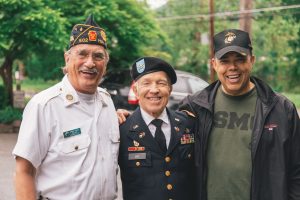
As news broke about the first case of a veteran residing in the Oregon Veterans’ Home passing due to COVID-19 related complications on March 22nd, I began to grow increasingly concerned. Of course I am concerned about COVID-19 and its impacts, but moreover I am increasingly concerned about the impact on our aging veteran population who are among those most at risk. I am worried that when they go, their legacy may disappear with them, and that is an extremely troubling thought,
For me personally, one of my greatest regrets in life was not digging deeper into the combat experience of my grandfather, a WWII veteran. Through most accounts, secondhand of course due to my lack of diligence, the man was a real hero. It was not as though I never spoke with my grandfather, quite the contrary. I spent a great deal of time with him and got to know him as a person but never as a veteran. He was a bit surly and grizzled, not in a bad way, more in a “I’ve lived through too much to deal with your crap, kid” kind of way. Because of this, I never wanted to get on his bad side and since he never wanted to come right out and tell his war stories, I was not about to pry. Due to my lack of prying, now that my grandfather has passed, his stories are dead and buried with him; nothing I can do will be able to recoup this loss or family history and that saddens me deeply.
A lot of veterans, myself included, are incredibly reluctant to tell our stories. We feel that our stories are not worth telling because they did not resemble Saving Private Ryan or we simply don’t wish to burden others with our ramblings about past glory. I know deep down that this is not true because I have been fortunate enough to be regaled with the stories of many World War, Korean, and Vietnam veterans, the majority of whom thought their stories would bore me; quite the opposite was true, I assure you (at least in most cases). Because of this reluctance, so many veteran’s stories go untold until the point when we ask for them.
The point of all this is not to spill the beans about my personal relationships and regrets but to illustrate the point that an untold story dies along with its owner. Our parents, grandparents, aunts, uncles, etc. are more at risk now than ever and we need to reach out and let their stories be heard. It could be an act as simple as giving a loved one a call that helps their legacy live on long after they depart. Not only will you get their story, you’ll probably make their day in the process.
This is my call to action: pick up the phone and give an aging veteran you love a call. Do it today, not tomorrow; we are experiencing a level of uncertainty in the world that makes tomorrow less of a certainty than ever. It’s just a phone call, it can take as little as five minutes out of your day. Interested in doing a bit more? Write their story down or even better grab a recorder so you can have an audio record of them telling their own story in their own words. Do you really want to make sure their legacy endures forever? Look into the Library of Congress’ Veteran History Project where you can submit an audio interview with a veteran that will stay as a searchable document in the archives with a level of access you deem fit.
Now go forth and gather those stories! Do it now so you won’t regret it later.

